
Ricky Martin is the fifth studio album and first English album by Puerto Rican singer Ricky Martin. It was released on May 11, 1999, by Columbia Records. Following the release of four Spanish-language albums, and the huge success of his fourth studio album, Vuelve (1998), Martin announced the recording of his first English language album. He worked with producers KC Porter, Robi Rosa, and Desmond Child to create the album. Musically, Ricky Martin consists of dance-pop tracks, power ballads, mid-tempo pop songs, and rock numbers. After the album's release, Martin embarked on the worldwide Livin' la Vida Loca Tour, which was the highest-grossing tour of 2000 by a Latin artist.

Alphaville is a German synth-pop band formed in Münster in 1982. They gained popularity in the 1980s. The group was founded by singers Marian Gold, Bernhard Lloyd, and Frank Mertens. They achieved chart success with the singles "Forever Young", "Big in Japan", "Sounds Like a Melody", "The Jet Set" and "Dance with Me". Gold remains the only continuous member of Alphaville.

"She Bangs" is a song recorded by Puerto Rican singer Ricky Martin for his sixth studio album, Sound Loaded (2000). The song was written by Desmond Child, Walter Afanasieff, and Draco Rosa, while the production was handled by Afanasieff and Rosa. It was released to radio stations by Columbia Records as the lead single from the album on September 22, 2000. A dance track with Latin and salsa music influences, its lyrics see Martin wanting to hold on to a woman, and the song is a "metaphor for the universe". The song received widely positive reviews from music critics, who often noted similarities with Martin's previous single "Livin' la Vida Loca", and received a nomination for Best Male Pop Vocal Performance at the 2001 Grammy Awards. "She Bangs" was commercially successful, reaching number one in seven countries, including Italy and Sweden, as well as the top five in Australia, Canada, the United Kingdom, and several other countries.

Sound Loaded is the sixth studio album by Puerto Rican singer Ricky Martin. It was released on November 14, 2000, by Columbia Records. Following the huge success of his first English album, Ricky Martin (1999), Martin returned to the studio to record its follow-up English album. He worked with producers Walter Afanasieff, Emilio Estefan, Draco Rosa, and Desmond Child to create the album. Musically, Sound Loaded consists of dance club tracks, pop songs, adult contemporary ballads, and mid-tempo Latin numbers. After the album's release, Martin embarked on a North American promotional tour.

Vuelve is the fourth studio album by Puerto Rican singer Ricky Martin. Sony Discos and Columbia Records released it on February 12, 1998. Martin worked with producers KC Porter, Robi Draco Rosa, and Desmond Child to create the album. Following the worldwide success of the song "María" from his previous album, A Medio Vivir (1995), Martin returned to the studio and began recording material while on tour. Vuelve is a Latin record with Latin dance numbers and pop ballads. "María" caught the attention of FIFA, who asked Martin to write an anthem for the 1998 FIFA World Cup being held in France. Martin subsequently recorded "La Copa de la Vida", composed by Porter, Rosa, and Desmond Child for the World Cup.
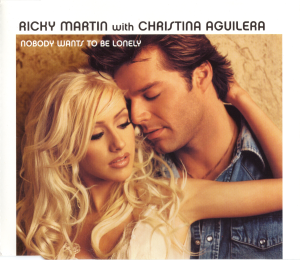
"Nobody Wants to Be Lonely" is a song by Puerto Rican singer Ricky Martin from his sixth studio album, Sound Loaded (2000). Martin re-recorded the song along with American singer Christina Aguilera in December 2000. The album version was written by Desmond Child, Victoria Shaw, and Gary Burr and produced by Child; the duet received additional production from Walter Afanasieff. The duet was released by Columbia Records on January 9, 2001, as the second single from the album. A mid-tempo pop song and power ballad with elements of flamenco and Latin music, it is about heartbreak and longing.
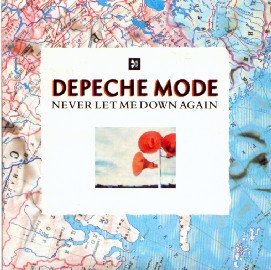
"Never Let Me Down Again" is a song by English electronic music band Depeche Mode. It was released as the second single from their sixth studio album, Music for the Masses (1987), on 24 August 1987. It reached No. 22 in the UK, No. 2 in West Germany, and the top-10 in several other European countries such as Sweden and Switzerland. The cover art features fragments of a Soviet map of Russia and Europe, with different fragments used for the different editions of the single.

"María" is a song recorded by Puerto Rican singer Ricky Martin for his third studio album, A Medio Vivir (1995). The song was written by Ian Blake, Luis Gómez Escolar, and KC Porter, while the production was handled by Porter, Tom Vickers, and Steve Berkowitz. It was released by Sony Music Mexico as the second single from the album on November 21, 1995. A Spanish language flamenco, dance, and salsa song, it is about an attractive but dangerous woman called "María". Local DJ Pablo Flores remixed the song, turning it into an up-tempo samba tune in a house bassline. The remix version became more popular than the original one.

"The Cup of Life" is a song recorded by Puerto Rican singer Ricky Martin for his fourth studio album, Vuelve (1998). Martin created the song after FIFA requested of him an anthem. The song was written by Luis Gómez Escolar, Desmond Child, and Draco Rosa, while the production was handled by the latter two. It was released by Columbia Records on March 9, 1998, as the second single from the album, and became the official song of the 1998 FIFA World Cup held in France. A primarily Spanish language samba-rooted Latin pop song, it carries a soccer-heavy message with fully positive lyrics.
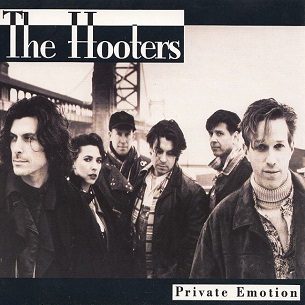
"Private Emotion" is a song recorded by American band The Hooters for their fifth studio album, Out of Body (1993). The song was written by Eric Bazilian and Rob Hyman, while the production was handled by Bazilian, Joe Hardy, and Hyman. It was released by MCA Records as the third single from the album in 1993. A ballad, using mandolin and Hammond organ, it is a love song that expresses a fresh emotion through an extreme desire to share love. The song received widely positive reviews from music critics, who complimented its use of instruments and Bazilian's vocal. A German-language version of the song, entitled "Heimliche Sehnsucht" was released in Germany in 1994.

"She's All I Ever Had" is a song recorded by Puerto Rican singer Ricky Martin for his fifth studio album and English-language debut, Ricky Martin (1999). The song was written by Jon Secada, Robi Rosa, and George Noriega, while the production was handled by Secada, Walter Afanasieff, and Noriega, with co-production from Rosa. It was released by Columbia Records as the second single from the album on June 15, 1999. A slow-tempo pop and rock ballad, it is a romantic love song, narrating the story of a man who misses his woman, while continuing to live and breathe for her. The song received widely positive reviews from music critics, who complimented the production and Martin's vocals. It was ranked as the third-best song from the Latin explosion of 1999 by Latina.

"Tal Vez" (transl. "Perhaps") is a song recorded by Puerto Rican singer Ricky Martin for his seventh studio album, Almas del Silencio (2003). The song was written by Venezuelan singer-songwriter Franco De Vita, while the production was handled by Tommy Torres. It was released to radio stations by Sony Discos as the lead single from the album on March 25, 2003. A Spanish language rock ballad, it is a romantic song about regret, lost opportunities, and last chances. The song received widely positive reviews from music critics, who complimented its melody, lyrics, and Martin's vocals. It was ranked as one of the Top Latin Songs of the Century by Latin Times.
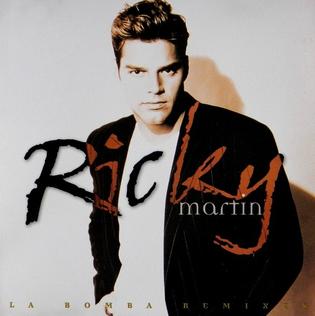
"La Bomba" is a song recorded by Puerto Rican singer Ricky Martin for his fourth studio album, Vuelve (1998). The song was written by Luis Gómez Escolar, K. C. Porter, and Draco Rosa, while the production was handled by the latter two. It was released by Columbia Records as the third single from the album on June 16, 1998. A Spanish language salsa, dance, and samba song, it is a metaphor in which Martin compares the music that makes the listener high from the rhythm of the dance to an alcoholic drink. The song received widely positive reviews from music critics, who complimented the danceable rhythm and highlighted it as one of the album's best tracks.

"The Best Thing About Me Is You" is a song by the Puerto Rican recording artist Ricky Martin, taken from his ninth studio album, Música + Alma + Sexo (2011). It was digitally released as the lead single from the album on November 2, 2010. The song had earlier premiered on radio's Ryan Seacrest show. The original English version of the song features singer Joss Stone, while its Spanish version, "Lo Mejor de Mi Vida Eres Tú", replaces Stone's vocals with Natalia Jiménez. "The Best Thing About Me Is You" was later featured on three of Martin's compilations: Greatest Hits (2011), Playlist: The Very Best of Ricky Martin (2012) and Greatest Hits: Souvenir Edition (2013).

"Amor" is the first English-language single from Ricky Martin's greatest hits album, The Best of Ricky Martin (2001). Originally, the song was included on the 2000 album, Sound Loaded. The Best of Ricky Martin contains two remixes of "Amor," by Salaam Remi and Jonathan Peters.

"Vuelve" is a song recorded by Puerto Rican singer Ricky Martin for his fourth studio album, Vuelve (1998). The song was written by Franco De Vita, while the production was handled by K. C. Porter and Draco Rosa. It was released to radio stations by Sony Discos as the lead single from the album on January 26, 1998. A Spanish language power ballad and Latin pop song with elements of rock and gospel, it is about the singer's true love, who gives the meaning of his life. It received generally positive reviews from music critics, who complimented its romantic lyrics and Martin's vocal.
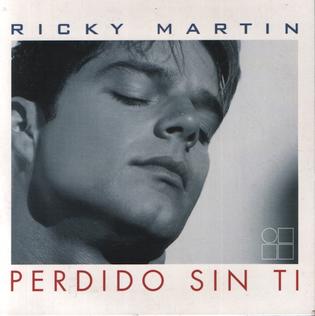
"Perdido Sin Ti" is a song recorded by Puerto Rican singer Ricky Martin for his fourth studio album, Vuelve (1998). The song was written by K.C. Porter, Robi Rosa, and Luis Gómez Escolar, while the production was handled by Porter and Rosa. It was released by Columbia Records as the fourth single from the album on August 18, 1998. A heart-wrenching, slow ballad, its protagonist is nostalgia. The song received positive reviews from music critics, who complimented its "sweetness" and "dreamy hook".

"Te Extraño, Te Olvido, Te Amo" is a song recorded by Puerto Rican singer Ricky Martin for his third studio album, A Medio Vivir (1995). The song was written by Carlos Lara, while the production was handled by K.C. Porter. It was released to radio stations and on CD by Columbia Records as the lead single from the album on September 5, 1995. A Spanish language soft ballad, it is about the singer's dream woman who has left him and as he struggles to forget her, he becomes depressed. It received widely positive reviews from music critics, who ranked it among Martin's best ballads.
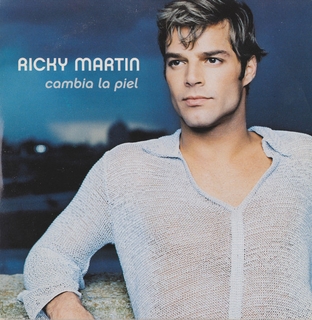
"Cambia la Piel" is a song by Puerto Rican singer Ricky Martin released as the only promotional single from his second English-language album, Sound Loaded (2000) in Spain and Latin America on October 15, 2001.



















